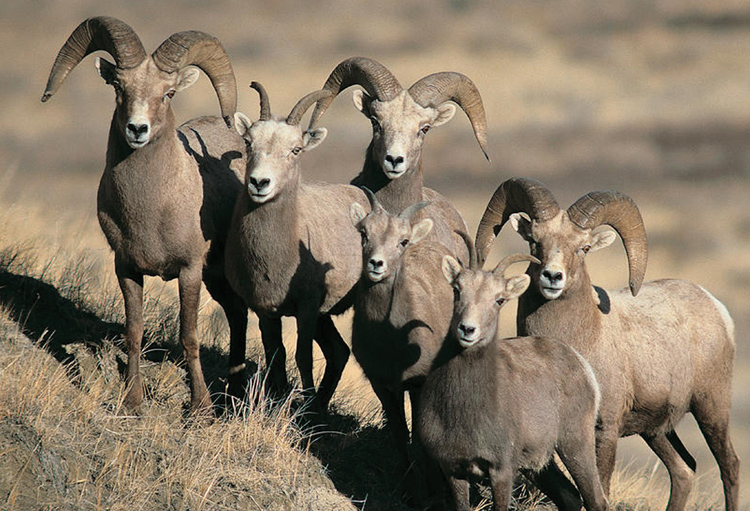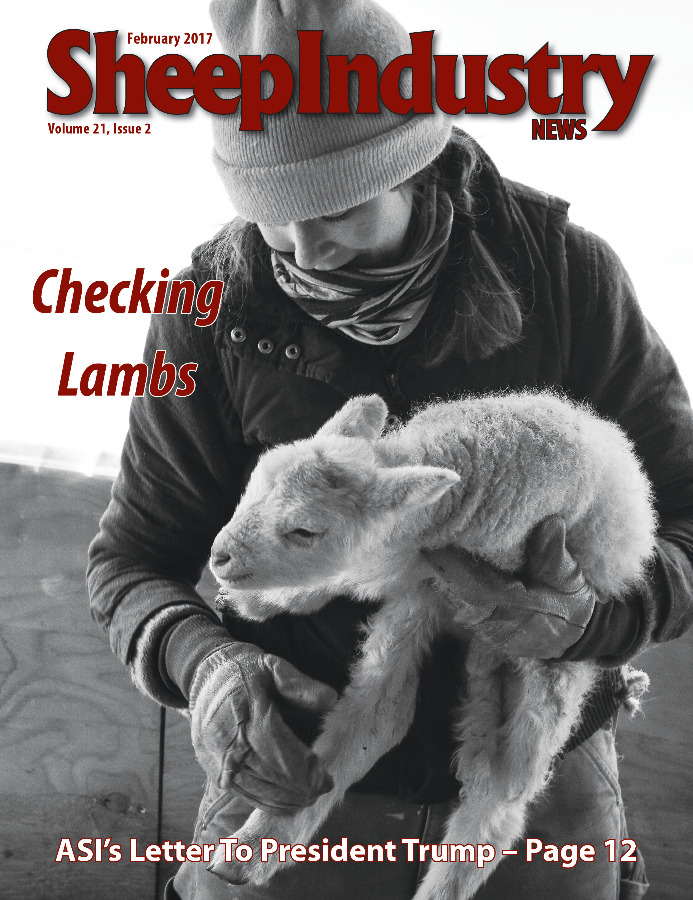Letter to President Trump
Editor’s Note: The following letter was submitted to then President-Elect Trump’s transition team in late December.
Dear President-Elect Trump,
On behalf of our nation’s sheep producers, we wish to congratulate you on your victory in the presidential election. ASI advocates on behalf of the nation’s 88,000 farm and ranch families that produce America’s lamb and wool. It is our hope that, as you begin your transition to the White House, you will consider the following priorities of our industry as priorities for your administration.
 America’s sheep producers continue a strong tradition of supporting wildlife habitat, natural resources and open space across the country, all enabled by careful resource management while grazing our flocks on private lands and federal grazing allotments on lands managed by the U.S Department of Interior’s Bureau of Land Management and the U.S Department of Agriculture’s Forest Service. Our members support rural communities, the tax base and local businesses; providing safe domestic food and fiber. In fact, the economic impact of sheep and wool production on our nation’s economy is immense. From on the farm and ranch to the retail level, the sheep industry has a total annual economic impact of $4.4 billion and supports nearly 98,000 sheep-industry related jobs.
America’s sheep producers continue a strong tradition of supporting wildlife habitat, natural resources and open space across the country, all enabled by careful resource management while grazing our flocks on private lands and federal grazing allotments on lands managed by the U.S Department of Interior’s Bureau of Land Management and the U.S Department of Agriculture’s Forest Service. Our members support rural communities, the tax base and local businesses; providing safe domestic food and fiber. In fact, the economic impact of sheep and wool production on our nation’s economy is immense. From on the farm and ranch to the retail level, the sheep industry has a total annual economic impact of $4.4 billion and supports nearly 98,000 sheep-industry related jobs.
Unfortunately, this significant economic impact has been threatened by bad policy and flawed regulations out of Washington.
For America’s sheep producers, the campaign’s focus on trade, specifically fair trade, mirrored the conversations and market conditions they have experienced for decades. A combination of the strong U.S. dollar and no restrictions on imported meat has created a severe disadvantage for lamb meat producers in the domestic market. The lamb industry continues to see record high cooler inventories and has been deluged by imported lamb marketed at greatly reduced prices. The United States is one of the most open markets in the world for lamb meat, yet key export markets such as Japan remain closed to American lamb creating the imbalance in trade we have seen. Markets such as the European Union and United Kingdom maintain significant barriers to lamb trade, which directs even more product from competing global lamb producers to the U.S. market. Our government should prioritize re-opening the Japanese market and generally pursue free trade and open access policies for the fair treatment of American lamb producers.
In recent years, America’s sheep producers have faced substantial challenges from overzealous and ideologically driven regulations, including the loss of allotments and access to grazing lands due to flawed science and supposed “conflicts” with wild bighorn sheep habitat, increased predation due to insufficient funding for USDA/APHIS Wildlife Services predator management, as well as the failure to delist recovered predator species such as the grizzly bear and wolf, litigation from radical environmentalists masquerading as wildlife advocates, and a lethargic permit approval system due to backlogs caused by unnecessary National Environmental Policy reviews. It is the view of the American sheep industry that science-based policy is in the best interest of producers specifically and U.S. citizens in general. Moreover, the science used to impact our agricultural competitiveness should include and be led by the USDA’s Agricultural Research Service and our land-grant universities.
With that background, we are asking that your administration specifically consider the following issues ripe for immediate executive action:
United States Department of Agriculture
• Increased agency requests for funding for USDA/APHIS Wildlife Services predation management.
• Every dollar spent on predation management returns three dollars in livestock value saved. This has a tremendous impact on sheep and cattle producers and the rural economies they support. Predator management also supports abundant wildlife, hunting and recreation activities on private and federal land. We ask that the administration request Congress fully fund the livestock protection efforts of Wildlife Services.
• Maintain USSES and support the merger of the USSES and the ADRU to sustain and grow their roles in food-animal science (NP-101), rangeland systems (NP-215) and animal health (NP-103) programs.
• Unsound regulations have arisen partly from radical environmentalists pushing their anti-federal land grazing views, views that are based on an ideology versus sound science. An important way forward is through the unique research provided by the U.S. Sheep Experiment Station located in Idaho and the Animal Disease Research Unit co-located at the University of Idaho and Washington State University (within WA 5th Congressional District). As our nation’s only experiment station primarily dedicated to sheep production, it is vital to our industry that this station continue its traditional work in not only food-animal research and animal health but also rangeland systems. Administrative action to limit the scope of the USSES threatens the viability of this resource unless range and animal science programs continue to be fully implemented. In addition, it threatens USSES’ unparalleled historical sage grouse range data.
• The USSES and ADRU research stations work in partnership and have a history of careful use of taxpayers’ monies to solve numerous sheep industry related challenges, as well as working to counter the flawed science and information propagated by those who wish to eliminate grazing and multiple use across our federal lands. These stations are key components of the USDA ARS, and the scientists who staff them truly understand their obligation to help solve problems facing producers and support farm communities. The American sheep industry expresses our strong support for the research conducted through the USSES and the ADRU. The research provided by this partnership is critical to returning economic competitiveness to the American sheep industry.
• Publish USDA/APHIS final rule on Scrapie in Sheep and Goats with ASI recommendations – Docket No. APHIS-2007-0127.
• ASI has long supported the eradication of scrapie from the United States and appreciates the efforts of USDA/APHIS and others who have made contributions on progress to that end. The amendments to this rule proposed by APHIS have been
carefully considered and are appropriate. We are currently awaiting USDA/APHIS review of comments and publication of the final rule.
• Immediate withdrawal of USDA/APHIS rule on Importation of Bone-In Ovine Meat from Uruguay.
• The rule released by USDA/APHIS would allow the importation of bone-in lamb from Uruguay. While ASI is a proponent of free and fair trade, this rule does not recognize Uruguay’s history of Foot and Mouth Disease and relies on an outdated and insufficient risk assessment. ASI requests USDA/APHIS conduct a current quantitative and qualitative risk assessment and re-examine the proposed surveillance-sampling plan, including serological sampling tests and protocols with evidence for effectiveness.
• Amend Current Mandatory Price Reporting to include cooperatives and provide confidentiality of prices reported.
• Like all segments of agriculture, the American sheep industry has experienced considerable processor consolidation the past decade and sheep producers rely on accurate timely price information to make marketing decisions. Appropriately applied confidentiality rules for price reporting in a dynamic and changing marketplace should give processors protection that the daily prices they report will not be traceable to them; therefore, protecting their business interests while not being so intractable and onerous as to prevent timely reporting. Additionally, approximately 30 percent of lambs are currently processed by one cooperative, however, due to the intricacies of their business model and USDA’s internal and antiquated rules, USDA does not allow cooperative structures to be fully included in Livestock Mandatory Reporting. These changes could be quickly incorporated, enjoy industry-wide consensus and provide all segments of the industry access to the information they need to succeed.
• Immediate withdrawal of the 2012 National Forest System Land Management Planning rule and any reference to “species viability.”
• The Forest Planning rule exceeds the intent of Congress to manage the nation’s forests. Moreover, “single species viability” as called for in the rule cannot be allowed to supersede all legal obligations for multiple use of federal lands, including grazing. Species viability, as implemented by the current administration, ignores historical habitat and enforces non-natural restraints on rangelands.
• Prior to any decision involving the proposed removal of domestic sheep allotments in preference to bighorn sheep habitat, we ask that the administration require sound science and consultation with ARS. And, should such a decision be found scientifically warranted, that alternative equal allotment(s) be offered and NEPA waived to minimize harm to livestock producers.
United States Department of the Interior
• Immediate withdrawal of Department of Interior Bureau of Land Management Policy 1730 – Management of Domestic Sheep and Goats to Sustain Wild Sheep.
• This guidance is based on flawed science and has led to a number of domestic sheep producers being removed from their allotments. Domestic sheep and bighorns have co-existed in many of the same areas for decades without significant impact to bighorn herds. There is no single, identifiable pathogen responsible for the most common respiratory diseases in bighorns that can clearly be tied to contact with domestic sheep on the open range. In fact, there are a number of documented bighorn die-offs in areas far removed from domestic sheep herds.
• De-list the grizzly bear and all species of wolves nationwide under the Endangered Species Act and return management of these species to the state governments.
• The populations of these species have returned to appropriate levels and continued federal protection under the ESA is no longer warranted. The current lack of state management of these species threatens the viability of the livestock and the greater wildlife ecosystem, including bighorn sheep, in these habitat areas, hampering our ability in the West to provide domestic food and recreation.
United States Department of Labor
• Endorse and support a more workable, less cumbersome H-2A program.
• The American sheep industry has a decades long history of a reliable, consistent and legal workforce. Sheep ranchers depend on the H-2A sheepherder program to help care for more than one-third of the ewes and lambs in the United States. To meet those needs, the industry has largely participated in temporary visa programs (in various forms) since the 1950s. As a result, today sheep producers employ a legal labor force with an estimated eight American jobs created/supported by each foreign worker employed.
• Increased regulation with ambiguous policies and enforcement have made the H-2A sheepherder program overly burdensome and logistically impossible for employers. In the 2015 re-write of the guest worker program, more than half the pages of regulations were aimed directly at sheepherders, despite the fact that we are only a small percent of the total H-2A employees in the United States. A Secretary of Labor with knowledge and understanding of the importance of a workable temporary foreign labor program is essential for the sheep industry and our nation’s ability to produce a secure food supply.
We thank you for your consideration of these issues and commit to working with your administration to ensure that your goals, and the goals of America’s sheep producers, are met. The viability of our rural communities depends on it. If we can provide further details or information, please contact Chase Adams at ASI.
Sincerely,
Burton Pfliger, ASI President


